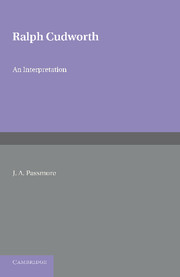Book contents
- Frontmatter
- Contents
- Preface
- Abbreviations
- CHAPTER I Cudworth and his Predecessors
- CHAPTER II Cudworth on Mind and Nature
- CHAPTER III Cudworth's Theory of Knowledge
- CHAPTER IV ‘Eternal and Immutable Morality’
- CHAPTER V Cudworth's Moral Psychology
- CHAPTER VI The Good Life
- CHAPTER VII Ethics and Religion
- CHAPTER VIII Cudworth and the British Moralists
- Appendix: The Cudworth Manuscripts
- A Cudworth Bibliography
- Index of Names
Appendix: The Cudworth Manuscripts
Published online by Cambridge University Press: 05 June 2016
- Frontmatter
- Contents
- Preface
- Abbreviations
- CHAPTER I Cudworth and his Predecessors
- CHAPTER II Cudworth on Mind and Nature
- CHAPTER III Cudworth's Theory of Knowledge
- CHAPTER IV ‘Eternal and Immutable Morality’
- CHAPTER V Cudworth's Moral Psychology
- CHAPTER VI The Good Life
- CHAPTER VII Ethics and Religion
- CHAPTER VIII Cudworth and the British Moralists
- Appendix: The Cudworth Manuscripts
- A Cudworth Bibliography
- Index of Names
Summary
In his life of Cudworth, which was first published in 1743, as a preface to the second edition of The True Intellectual System, Birch describes in some detail certain of Cudworth's unpublished writings:
(1) A Discourse of Moral Good and Evil.
(2) A Discourse of Liberty and Necessity.
(3) Daniel's Prophecy of the Seventy Weeks.
(4) Of the Verity of the Christian Religion against the Jews.
(5) A Discourse of the Creation of the World, and Immortality of the Soul.
(6) Hebrew Learning.
(7) An explanation of Hobbes's notion of God and of the extension of spirits.
At this time, the manuscripts were apparently in the possession of the Masham family. Thereafter, their history is more than a little peculiar. In 1762, the last Lord Masham (not a descendant of Damaris Cudworth, who became Lady Masham, but of her husband's first wife) sold the MSS, along with a part of Locke's library, which Locke had bequeathed to the Masham family, to a bookseller, Mr Robert Davies of Piccadilly. Davies decided to assume that Locke was the author of the MSS, a point on which he remained obdurately fixed, for motives which it is not difficult to understand. Although at first he failed to find a purchaser, and took the manuscripts with him on his retirement to the country, his investment was not to prove entirely unfruitful. A certain Rev. Mr Dodd, later to be executed for forgery, was at that time preparing a Commentary on the Bible, in which Davies had a pecuniary interest; the appearance in this Commentary of a number of ‘notes by Mr Locke’ served, as the Critical Review puts it, ‘to give an extraordinary eéclat to that work’. But Dodd was no more successful than Davies in finding a purchaser4 and the MSS returned to their country garret ‘exposed to the rats, and the depredations of the maid’. They were finally rescued by ‘a gentleman, who had a veneration for the name of Mr Locke’ (the British Museum has no record of his name) who bought them, soon discovered their real authorship, and arranged for their purchase by the British Museum— ‘at last, after many perils and mutilations, they are safely lodged in that noble repository’.
- Type
- Chapter
- Information
- Ralph Cudworth , pp. 107 - 113Publisher: Cambridge University PressPrint publication year: 2013

